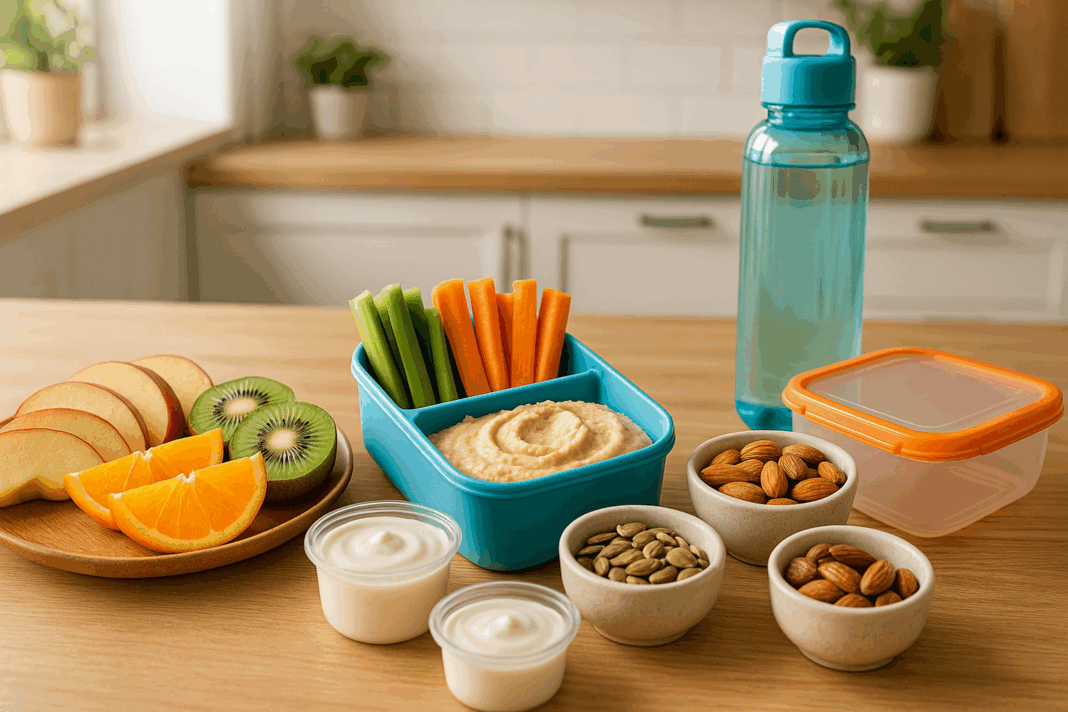In a world that rarely slows down, finding time to eat well can often feel like a luxury rather than a priority. Between juggling work responsibilities, personal obligations, and the constant hum of digital connectivity, many individuals find themselves reaching for whatever snack is closest and most convenient. Unfortunately, convenience often comes at the cost of nutrition. But smart snacking doesn’t have to be complicated or time-consuming. By shifting our focus toward whole food snacks on the go, we can support our energy levels, mental clarity, and overall health without sacrificing taste or practicality. This article explores the science, strategies, and sustainability of incorporating whole food snack ideas into everyday routines, while also discussing the intersection of snacking with structured meal prep strategies like high protein make ahead breakfast options and meal prep protein breakfast planning.
You may also like: Healthy Plant-Based Dinners Made Easy: Best Whole Food Plant-Based Recipes for Beginners and Beyond
The Power of Whole Foods in Everyday Nutrition
Whole foods are those that are minimally processed, free from artificial ingredients, and close to their natural state. Think fresh fruits, vegetables, whole grains, legumes, nuts, seeds, and lean proteins. The nutritional advantage of whole food snacks lies in their complex carbohydrate structures, fiber content, and naturally occurring vitamins and minerals. These components contribute to slower digestion, more stable blood sugar levels, and sustained satiety—an ideal formula for snacks that do more than simply curb hunger.
Unlike processed snack foods, which often deliver quick energy spikes followed by inevitable crashes, whole food snacks provide lasting fuel. A handful of almonds and a banana, for example, offer fiber, potassium, and healthy fats that not only sustain physical energy but also enhance cognitive function. When chosen intentionally, these snacks can even complement larger nutritional goals such as muscle maintenance, hormonal balance, and metabolic health. Incorporating whole food snacks on the go into one’s diet is not only a practical decision but also a preventative strategy that supports long-term well-being.
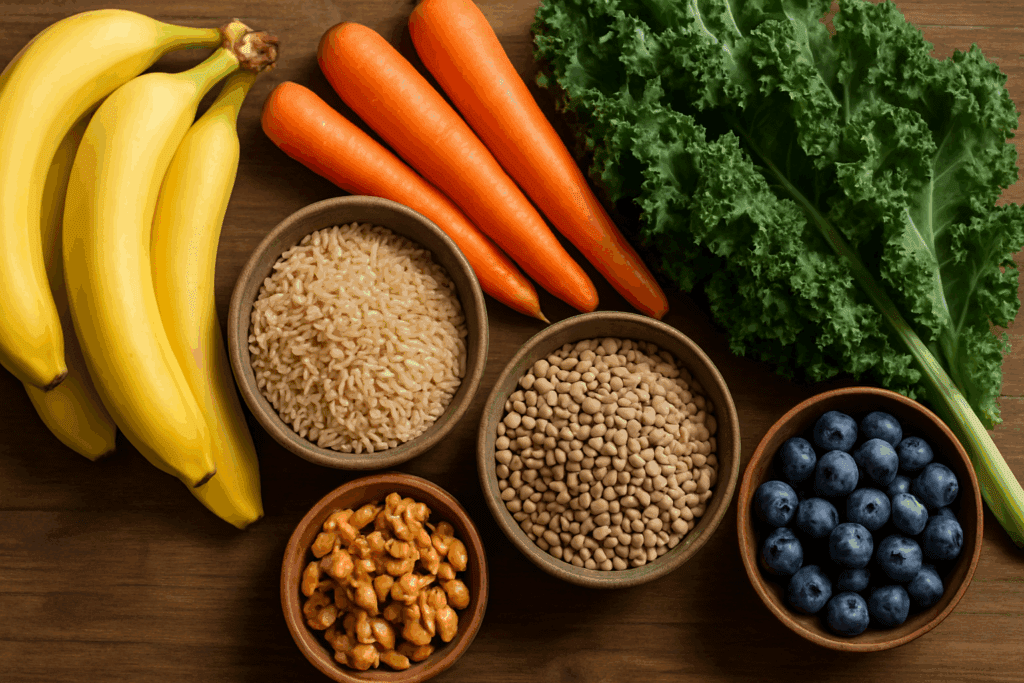
Why On-the-Go Snacking Needs a Rethink
In the traditional sense, snacks were once considered filler foods—a bridge between meals, often relegated to vending machine fare or sugar-laden treats. However, with evolving lifestyles and a growing understanding of nutrition science, the role of snacking has changed dramatically. For active professionals, parents, and students alike, snacks are no longer optional luxuries; they are essential building blocks of a healthy daily routine.
On-the-go lifestyles demand flexibility, which is why portability and shelf-stability have become prime considerations in snack selection. But convenience should not equate to nutritional compromise. Too often, grab-and-go snacks are high in refined sugars, unhealthy fats, and sodium, all of which contribute to inflammation, weight gain, and fatigue. The challenge, then, is finding whole food snack ideas that travel well, satisfy hunger, and nourish the body. It’s a challenge that can be met with preparation, creativity, and an understanding of functional nutrition.
Strategies for Successful Whole Food Snacking
Smart snacking begins with planning. One of the most effective strategies is preparing a small assortment of snack options at the start of the week. This can include washed and cut vegetables like carrots and bell peppers, hard-boiled eggs, homemade trail mix, or portioned servings of hummus. These options can be stored in airtight containers and kept in the refrigerator or a cooler bag for easy access throughout the week.
Another strategy is to align snacks with macronutrient balance. Ideally, a snack should contain a source of protein, a healthy fat, and a fiber-rich carbohydrate. This trifecta ensures sustained energy and helps prevent blood sugar fluctuations that can lead to energy crashes. For example, an apple with almond butter, or a slice of whole grain bread with avocado and turkey breast, makes for a portable, nutrient-dense option. When traveling, shelf-stable options such as roasted chickpeas, nut bars, and unsweetened dried fruit can be excellent alternatives.
Integrating high protein make ahead breakfast options into your weekly routine is another excellent way to ensure you begin the day on a stable nutritional footing, which in turn reduces the urge for unhealthy snacking later. Preparing overnight oats with Greek yogurt and chia seeds, or baking egg muffins with vegetables and lean meats, provides a powerful foundation that supports energy and focus throughout the day.
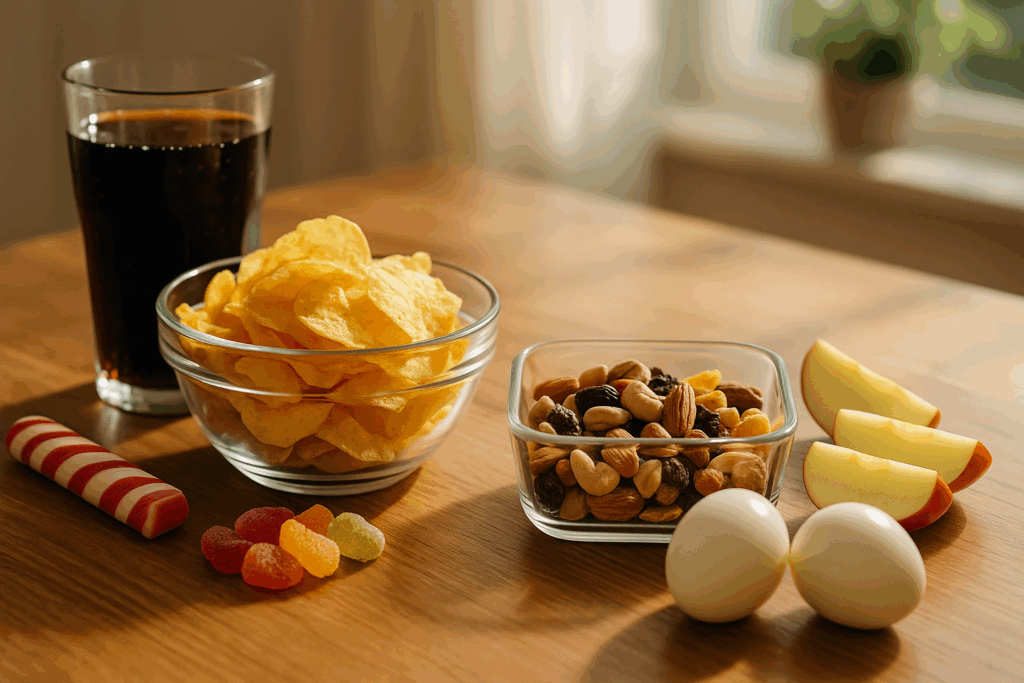
The Role of Protein in Snack Sustainability
Protein plays a vital role in satiety, muscle maintenance, and metabolic function. Including protein-rich snacks helps prevent the cycle of constant hunger and poor food choices. For individuals managing weight or pursuing fitness goals, incorporating meal prep protein breakfast foods into their regimen creates a natural continuity between meals and snacks. Protein not only sustains energy but also aids in the repair and growth of tissues, making it indispensable for physically active individuals.
Examples of protein-forward snacks include cottage cheese with berries, edamame, turkey roll-ups, or a scoop of protein powder blended with unsweetened almond milk and frozen fruit. These snacks can be portioned ahead of time and stored in insulated containers for grab-and-go accessibility. Additionally, plant-based protein options such as pumpkin seeds, tofu bites, and lentil-based dips offer variety and accommodate diverse dietary preferences.
Maintaining a consistent intake of high-quality protein also supports the body’s natural rhythms and hormonal balance. When paired with complex carbohydrates and healthy fats, protein-rich snacks can enhance cognitive performance, especially during the mid-morning or late-afternoon energy dips that many people experience. Thus, whole food snacks on the go, when thoughtfully constructed, can rival even small meals in nutritional density.
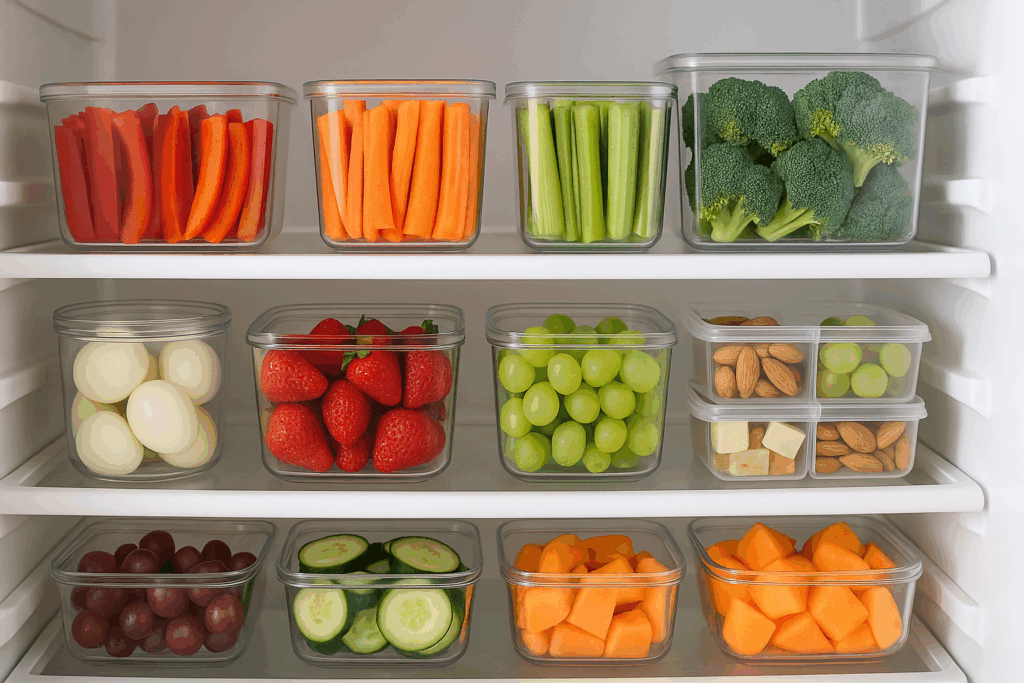
Make Ahead Snacks: Bridging Convenience and Health
Meal prepping is a tool often reserved for full meals, but it can be just as transformative when applied to snacking. Preparing a batch of make ahead protein breakfast items, such as chia seed pudding or baked oatmeal cups, ensures that even your first meal of the day adheres to the principles of whole-food nutrition. These items can be individually packaged and stored in the refrigerator, streamlining your morning routine while providing long-lasting energy.
Similarly, snack prep can include DIY energy balls made from oats, nut butter, flaxseeds, and a touch of honey. These snacks are rich in fiber, omega-3 fatty acids, and natural sweetness, making them a superior alternative to store-bought bars. Another approach is creating snack boxes or bento-style containers filled with a variety of small whole food components such as cucumber slices, boiled eggs, cherry tomatoes, olives, and nuts. These provide not only variety but also a sense of satisfaction that curbs mindless eating.
The process of preparing these foods in advance can also reinforce healthy eating habits and a greater sense of mindfulness around nutrition. When we engage in meal prep protein breakfast routines and snack prep simultaneously, we streamline our entire day nutritionally. We reduce the temptation to make impulsive food choices and empower ourselves with meals and snacks that reflect our values and goals.
Portable Whole Food Snack Ideas That Travel Well
Not all snacks are suited for travel, especially when refrigeration is unavailable. However, there are many whole food options that are both portable and stable at room temperature. Roasted nuts and seeds, for example, are nutrient-dense and easy to carry. Pairing them with dried fruit creates a satisfying sweet-and-salty mix that is both energizing and nourishing.
Rice cakes with almond butter, single-serving packets of olives, and vacuum-sealed tuna or salmon pouches are also excellent choices for those on the go. These options offer protein, healthy fats, and important micronutrients like omega-3 fatty acids and iron. Whole grain crackers with hummus or nut-based spreads further round out the list of practical, whole food snacks.
For longer trips or workdays, consider investing in an insulated lunch bag with ice packs to expand your options. This makes it possible to carry cut fruit, yogurt, or veggie wraps safely. In doing so, you can maintain the integrity of your whole food snacks on the go, ensuring they remain both safe and appetizing until consumed.
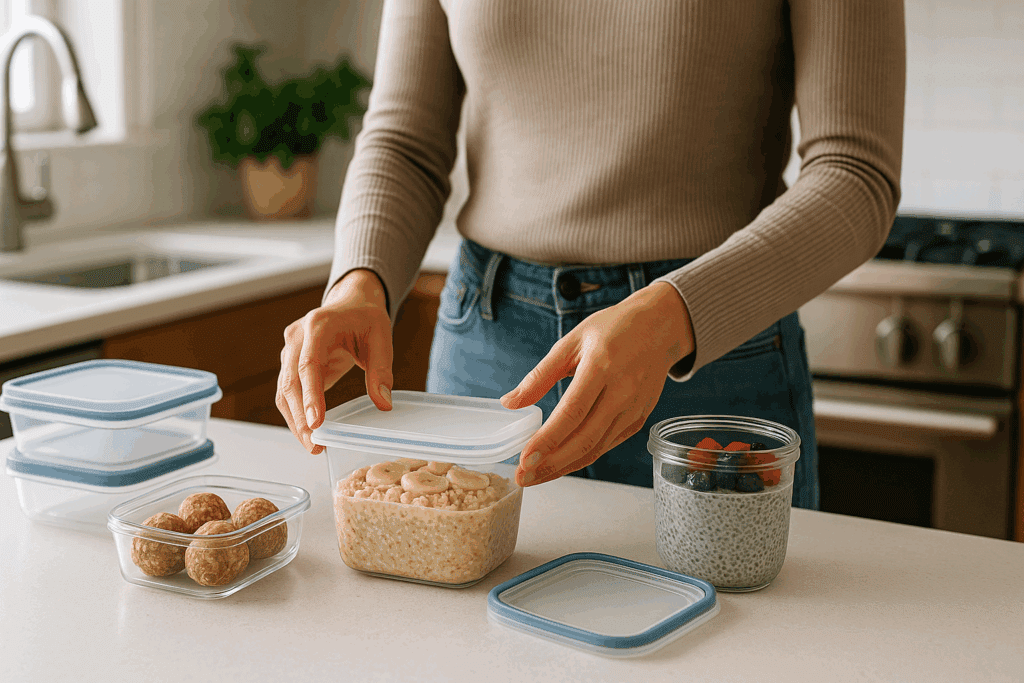
The Science of Satiety: Why Smart Snacking Works
Satiety, or the sensation of fullness and satisfaction after eating, is influenced by a combination of hormonal signals, gastric emptying, and nutrient content. Whole food snacks, especially those rich in fiber and protein, promote satiety more effectively than processed alternatives. Fiber slows digestion and expands in the stomach, signaling fullness. Protein, on the other hand, affects appetite-regulating hormones such as ghrelin and peptide YY.
By consuming whole food snacks on the go that emphasize these nutrients, individuals can reduce their total caloric intake while still feeling energized and mentally sharp. This is particularly important for those managing weight or blood sugar levels. The act of chewing, as well, plays a surprisingly important role in satiety. Whole foods typically require more mastication, which enhances the brain’s perception of eating and contributes to greater satisfaction.
Additionally, pairing snacks with hydration supports digestion and further promotes fullness. Drinking water with or shortly after a snack can help ease digestion, especially when consuming high-fiber options like raw vegetables or whole grains. Thus, smart snacking is not simply about what we eat, but how and when we eat it, all of which contribute to its effectiveness in sustaining energy and health.
Mindful Eating: Connecting Emotion and Nutrition
Mindful eating encourages a deeper awareness of the foods we consume and the impact they have on our body and mood. By focusing on whole food snack ideas and taking time to enjoy each bite, we cultivate a healthier relationship with food. Mindful snacking can help break the cycle of emotional or stress eating, allowing us to respond to true hunger cues rather than habitual or emotional impulses.
This practice also supports better digestion, as eating slowly and thoughtfully activates the parasympathetic nervous system, which is responsible for rest and digestion. When we snack mindfully, we are less likely to overeat and more likely to feel satisfied with less. Additionally, being present during meals and snacks fosters greater appreciation for food quality, encouraging us to choose whole food snacks over processed ones.
Pairing this approach with meal prep strategies like high protein make ahead breakfast routines provides a foundation of structure and intention. When we start the day with a balanced, nutrient-rich meal that has been prepared in advance, we set a tone of mindfulness and nourishment that often carries through to our snack and meal choices for the remainder of the day.
Whole Food Snacks for Different Lifestyles
Not all lifestyles are the same, and snack needs will vary accordingly. For busy professionals, compact, energy-dense snacks such as nuts, hard cheese, or dark chocolate-covered almonds can offer a quick, satisfying reprieve from a hectic schedule. For athletes and fitness enthusiasts, snacks that combine fast-acting carbohydrates and protein—such as bananas with protein shakes or rice cakes with turkey—can support performance and recovery.
Parents may find that portable snacks like mini quesadillas, homemade granola bars, or pre-cut fruit and cheese cubes are ideal for both themselves and their children. For individuals following plant-based diets, incorporating legumes, seeds, and nut-based snacks ensures adequate protein intake and variety. Make ahead protein breakfast options like tofu scrambles or quinoa breakfast bowls can serve as templates for snack prep as well, especially when portioned into small containers.
Even retirees or individuals working from home benefit from having prepared whole food snacks on hand. Without structured meal times or the accountability of a work schedule, grazing can become a mindless habit. Planning and prepping whole food snack options helps instill structure and supports sustained energy throughout the day.
Supporting Long-Term Health Through Daily Habits
Whole food snacking is not just a trend but a sustainable approach to daily nourishment. When integrated into a larger lifestyle framework that includes regular physical activity, stress management, and adequate sleep, smart snacking contributes significantly to long-term health. It helps regulate metabolism, reduce inflammation, and maintain stable energy levels, all of which play roles in disease prevention and cognitive function.
Moreover, the habits we cultivate around snacking often extend to our broader relationship with food. Choosing to prepare make ahead protein breakfast meals and snacks each week fosters a sense of agency and responsibility. It transforms eating from a reactive behavior to a proactive strategy for wellness. This shift can be especially empowering for individuals with specific health concerns or dietary restrictions, as it allows for greater control over ingredient quality and nutrient composition.
The process of preparing, selecting, and consuming whole food snacks on the go ultimately strengthens our connection to the body and its needs. Rather than eating out of convenience or boredom, we begin to eat with purpose and presence. This, in itself, is a powerful form of self-care.
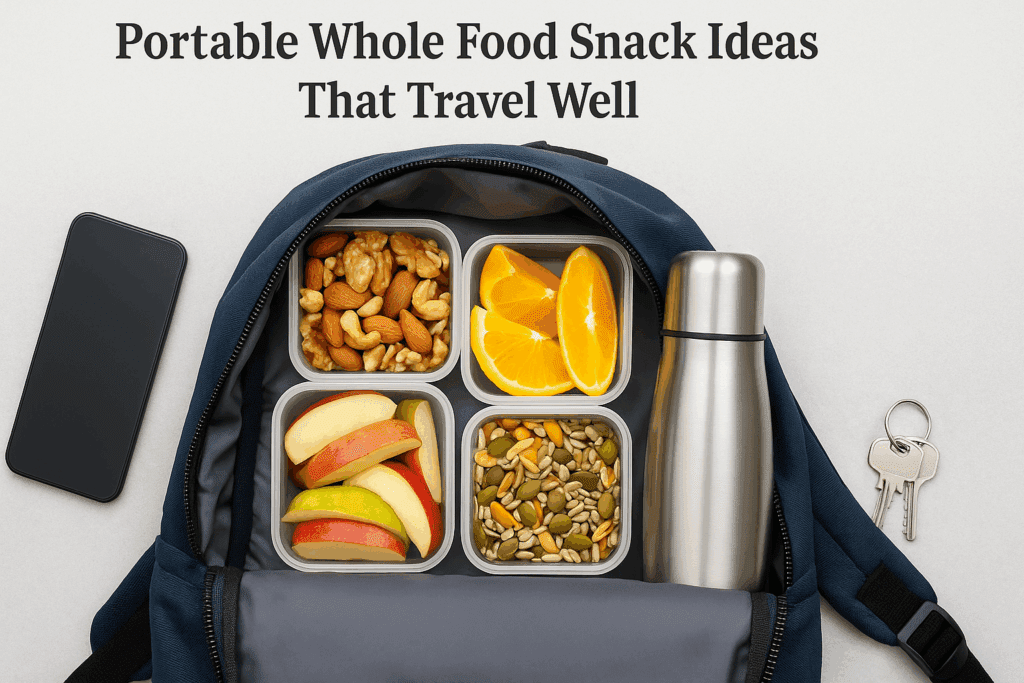
Frequently Asked Questions: Whole Food Snacks on the Go
What are some advanced ways to personalize whole food snacks on the go for different dietary goals?
Personalizing whole food snacks on the go can be incredibly effective when considering individualdietary goals like weight loss, muscle gain, or hormone balance. For example, those seeking muscle growth might add a scoop of unflavored collagen peptides to homemade energy bites, while someone following a low-glycemic plan may focus on pairing vegetables like celery with almond butter or hummus. Those prioritizing hormone health can incorporate flaxseeds and pumpkin seeds, which support hormonal equilibrium due to their lignan and zinc content. Additionally, making snack swaps—such as using roasted seaweed in place of crackers or avocado slices for creamy spreads—can help support nutrient timing goals. These tweaks allow you to turn generic whole food snack ideas into tailored, functional fuel.
Can whole food snacks on the go support cognitive performance during long workdays?
Absolutely, and the nutritional composition of your snacks matters significantly for brain health. Wholefood snacks on the go that combine omega-3 fats, protein, and complex carbohydrates can stabilize blood sugar and enhance neurotransmitter function. A small handful of walnuts paired with blueberries, for example, supports memory and learning due to their antioxidant and anti-inflammatory properties. Similarly, dark chocolate with pumpkin seeds offers magnesium and flavonoids that enhance focus without the crash of sugary treats. Investing in snacks that are rich in nutrients shown to support brain health can yield improved productivity and sustained mental clarity throughout the day.
How can parents encourage kids to adopt whole food snack ideas without resistance?
Making whole food snack ideas fun and interactive is key to winning over children. Bento-style snackboxes featuring colorful fruits, crunchy veggie sticks, and fun-shaped cheese slices can make healthy eating feel like a treat. Getting children involved in the preparation process—like shaping their own energy balls or building fruit kabobs—fosters ownership and excitement. When parents model consistent behavior by also choosing whole food snacks on the go, it reinforces these habits through example. Over time, creating positive associations around healthy snacking helps children develop a lifelong appreciation for nourishing foods.
Are there any emerging trends in whole food snack ideas within the wellness industry?
One notable trend involves the integration of adaptogens and superfoods into portable snack options.Brands and home cooks alike are now infusing snacks with ingredients like ashwagandha, spirulina, and maca root to enhance stress resilience and energy. Another growing trend is fermentation—snacks like kimchi bites and probiotic-rich nut cheeses are gaining traction for their gut health benefits. Additionally, minimalist snacking is rising, emphasizing single-ingredient whole food snacks on the go like freeze-dried peas or roasted lupini beans. These evolving innovations reflect a more holistic approach to nourishment, where snacks support more than just hunger control.
What tools or containers make transporting whole food snacks on the go easier and safer?
Investing in high-quality containers is essential to keep whole food snacks fresh and safe, especiallywhen refrigeration isn’t accessible. BPA-free, compartmentalized lunch boxes allow for neat storage of dips, spreads, and solids without mixing textures. Insulated snack bags with built-in gel packs help maintain safe temperatures for perishable items like hard-boiled eggs or yogurt parfaits. Collapsible silicone containers are excellent for minimizing storage space after use, while glass jars work beautifully for layered snacks like parfaits or overnight oats. Choosing the right container can transform your snacking routine by preserving freshness and encouraging consistency.
How can whole food snack ideas help with emotional or stress eating patterns?
Whole food snack ideas that incorporate calming nutrients like magnesium, tryptophan, and complexcarbohydrates can help regulate mood and emotional response. For example, pairing banana slices with tahini provides natural sweetness, healthy fat, and amino acids that support serotonin production. Mindful snacking practices, such as pausing to eat in a quiet space or doing a few deep breaths beforehand, help shift snacking from reactive to intentional behavior. When whole food snacks on the go are selected with awareness, they become tools for emotional regulation rather than mindless indulgence. Over time, this approach can build resilience against stress-driven eating habits.
What role does seasonal eating play in planning whole food snacks on the go?
Embracing seasonal ingredients can enhance both the flavor and nutritional value of your whole foodsnacks. Seasonal fruits and vegetables are typically more nutrient-dense, affordable, and environmentally sustainable. In the summer, portable snacks might include fresh berries, cherry tomatoes, or cucumber slices with tzatziki, while autumn snacks could feature apple slices with cinnamon almond butter or roasted squash seeds. Incorporating locally grown, in-season produce helps support agricultural biodiversity and connects you more closely with the rhythms of nature. This seasonal approach brings freshness and variety to your whole food snack ideas year-round.
How can busy professionals overcome the time barrier to preparing whole food snacks?
Time management is crucial, and a few strategic habits can make preparing whole food snacksseamless even for the busiest professionals. Setting aside 30 minutes once or twice a week for snack prep—chopping veggies, portioning nuts, or assembling grab-and-go packs—builds a reliable snacking inventory. Stocking your pantry with quick-assembly ingredients like canned beans, dried fruit, or pre-cooked grains allows for creative improvisation when time is tight. Whole food snacks on the go that require no cooking, like avocado rice cakes or almond-stuffed dates, can be prepped in minutes. Automation through recurring grocery delivery services can also ensure your kitchen stays well-stocked with healthy basics.
Are there cultural or global influences that can inspire whole food snack ideas?
Yes, drawing inspiration from global cuisines can elevate your snacking experience with new texturesand flavors. Mediterranean snack traditions, for example, often feature olives, hummus, and grape leaves, while Japanese cuisine introduces options like edamame, nori, and miso-dusted rice crackers. Indian spice blends like chaat masala or turmeric can add complexity to roasted chickpeas or vegetable slices. Exploring international food traditions not only expands your palate but also makes your whole food snacks on the go feel more exciting and diverse. Incorporating cultural elements adds both culinary and nutritional richness to your everyday snacking.
What long-term health benefits are associated with choosing whole food snacks on the go?

Choosing whole food snacks on the go consistently can yield lasting improvements in metabolichealth, digestion, and cognitive performance. Over time, reducing reliance on processed snacks lowers systemic inflammation, improves insulin sensitivity, and supports gut microbiota diversity. This dietary shift also positively influences mood, sleep quality, and immune resilience. Whole food snack ideas rooted in variety and balance contribute to nutrient sufficiency, making deficiencies less likely. When sustained over months and years, these small changes can significantly reduce the risk of chronic conditions such as heart disease, type 2 diabetes, and certain cancers.
Reclaiming Energy and Vitality Through Smart Snacking
In today’s fast-paced world, nutrition often takes a back seat to convenience. However, by embracing the principles of smart snacking and emphasizing whole food snacks on the go, we can reclaim both energy and vitality without sacrificing efficiency. These simple yet powerful changes to our daily routines offer a pathway to improved mental clarity, emotional resilience, and physical well-being.
When we prepare high protein make ahead breakfast options and incorporate meal prep protein breakfast strategies, we create a nutritional foundation that supports better choices throughout the day. These habits reduce reliance on processed foods and strengthen our ability to fuel the body with what it truly needs. More importantly, they nurture a mindful, intentional approach to eating that enhances our relationship with food.
Whole food snacks are more than just a health trend—they are a tool for living well. They reflect a commitment to quality, balance, and self-respect. As we shift toward more conscious, prepared eating habits, we empower ourselves to live not only longer but also fuller, more vibrant lives. Smart snacking, then, is not just simple. It is essential.
Further Reading:
30 High Protein Snacks That Are Healthy and Portable

